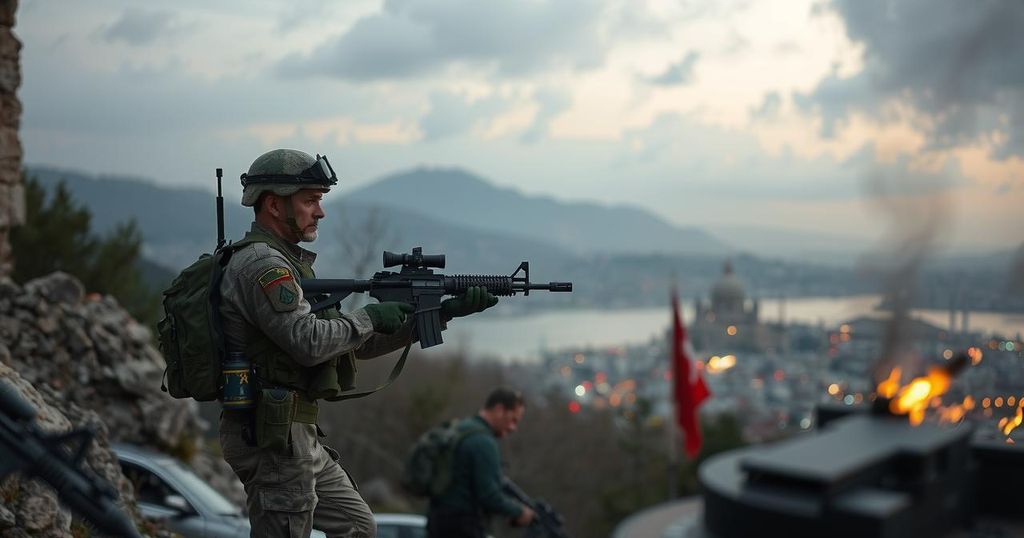Turkey Conducts Airstrikes in Response to Attack on Defense Company

Turkey launched airstrikes in Iraq and Syria targeting Kurdish groups in retaliation for an attack on TUSAS, a defense company, which resulted in five deaths. The PKK is accused of orchestrating the assault, which complicates the existing peace dialogue. Notable politicians have condemned the attack, while observers question the possibility of future peace efforts amid these escalating tensions.
Turkey has conducted airstrikes targeting Kurdish positions in Iraq and Syria following a deadly attack on the Turkish defense company TUSAS, which resulted in five fatalities and over 20 injuries. The Ministry of National Defence reported that 32 targets were “destroyed” during the aerial offensive, though specific locations were not disclosed. The strikes were a direct response to an incident where suspected members of the Kurdistan Workers’ Party (PKK) detonated explosives and opened fire at TUSAS, a facility responsible for the design and production of various military and aerospace technologies. Interior Minister Ali Yerlikaya accused the PKK of orchestrating the attack, while Defence Minister Yasar Guler asserted, “We give these PKK scoundrels the punishment they deserve every time. But they never come to their senses. We will pursue them until the last terrorist is eliminated.” The Kurdish group, which has been engaged in a long-standing conflict with the Turkish state since the 1980s, has yet to issue a response to these claims. The incident occurs amidst considerations about potential negotiations with the PKK, as noted by Devlet Bahceli, the leader of Turkey’s Nationalist Movement Party (MHP), regarding the future of PKK leader Abdullah Ocalan. Turkish President Recep Tayyip Erdogan condemned the attack during discussions with Russian President Vladimir Putin. The Iraqi embassy in Ankara has also expressed solidarity with Turkey, reaffirming its denunciation of terrorism. Turkey routinely targets the PKK in Iraq and affiliated groups in Syria, which remain key adversaries in Turkey’s military operations. The UAVs developed by TUSAS have played a crucial role in enhancing Turkey’s operational advantage against Kurdish fighters. The PKK has long sought autonomy in southeastern Turkey but is designated a terrorist organization by Turkey and many of its Western allies. The recent attack and Turkey’s retaliatory strikes raise questions about the future of peace negotiations, especially as the pro-Kurdish DEM party observes the timing of the assault in light of potential dialogues to resolve the longstanding conflict. Observers are now left to ponder whether dialogue remains viable under the current tensions.
The Kurdistan Workers’ Party (PKK) has been involved in a conflict with the Turkish government since the 1980s, aiming for greater autonomy for Kurds in southeastern Turkey. The group is classified as a terrorist organization by Turkey and its allies, complicating peace efforts. Turkey has a history of military operations against the PKK and its affiliates in Iraq and Syria, with the recent airstrikes reflecting ongoing hostilities in the region. Additionally, the use of UAVs produced by TUSAS has been significant in Turkey’s strategy against Kurdish fighters. The TUSAS attack serves as a stark reminder of the volatility surrounding Turkish-Kurdish relations and the challenges to peace negotiations that have surfaced intermittently over the years.
The airstrikes conducted by Turkey against Kurdish targets in Iraq and Syria represent a significant escalation stemming from the recent attack on TUSAS, highlighting the enduring conflict between the Turkish state and the PKK. With both sides holding firm to their positions, the possibility of peace negotiations seems increasingly tenuous. This incident underscores the complexities of combating terrorism while also seeking a resolution to longstanding grievances and the potential for further violence in the region.
Original Source: www.aljazeera.com







